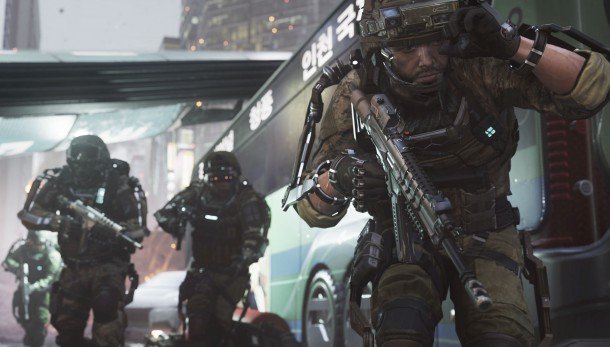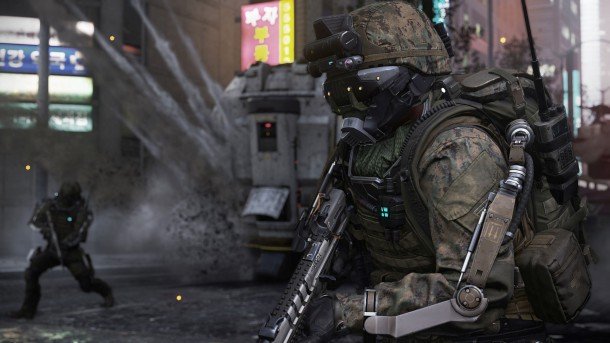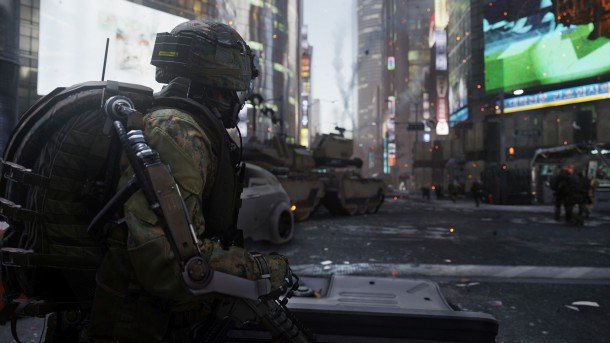Call of Duty: Advanced Warfare preview: can laser rifles and stealth mines refresh the CoD formula?

Call of Duty has a laser gun. And a jetpack (okay, okay: jump -pack. Semantics.). And grenades that you don't have to throw. And a cloaking device. And a landmine that cancels sound? Activision toured me through this new futuretech after inviting me to watch more than 30 minutes of Advanced Warfare that wasn't shown at Microsoft's E3 press conference earlier this week.
First: a recap on Advanced Warfare if you haven't been following along. It's developed by Sledgehammer Games, a relatively new Activision studio that contributed to Modern Warfare 3. It has the distinction, among Call of Duty games, of being developed over a three-year period. It's set in 2085 in America and other parts of the world, with a focus on (you guessed it) warfare with hovertanks, drones, and high-technology based on Sledgehammer's real-world research and imagination. Its campaign has a single protagonist, it'll be out in November, and Activision is saying absolutely nothing about multiplayer yet.
At E3 this week I was shown two campaign levels nearly in their entirety. I walked away impressed by the quality of art, animations, and sound shown in these sections, which represent a significant leap over Modern Warfare 3—that laser rifle I mentioned feels like a Wolfenstein weapon, piercing your ears with an inexplicably fitting, metallic thunk every time you fire. Outside of that, though, what I saw it simply felt like an echo of every other Call of Duty campaign I've played.
The first level Sledgehammer showed me began as a stealth-focused escape mission in the vein of other Call of Duty levels where you and a AI partner slink through an environment undetected, silently executing sentries along the way. Mitchell, the campaign's player character, is sprinting through a Bulgarian forest. There's a helicopter tailing him and his partner, shining a searchlight after them as they bound through high grass and over rocky forest. Eventually they're free to activate the cloaking systems on their exosuits, but cloaking didn't break the rhythm of stealth killing and evasion. I noticed one distracting visual discrepancy, too: the feet of my cloaked teammate didn't bend any grass or shrubbery as he moved through it.

Each moment of this introductory section felt like Simon-Says, with the partner character vocalizing each maneuver (at one point, a cloak-cancelling searchlight appears: “Seeker. Cloak's useless against it, avoid the beam. Wait for the patrol to pass.”), and you obediently executing. I didn't get to play, so I can't say for sure how much room for experimentation or error this section includes, but nothing indicated that it was much. Sneaking up behind a transport truck at one point, a mine-shaped light flashes on the ground, inviting the player to place a mine there. Why hold the player's hand that much? The gadget itself was interesting: a disc with a handle attached that dampened all sound temporarily in a small radius—essentially cloaking all sound in the location—and muffling all in-game sounds for the player in the process. But the tool's function here was pretty boring: it simply permitted Mitchell to take out two guards from behind at close range.
Halfway through the stage, Mitchell and his partner linked up with two other exosuited soldiers on a cliff overlooking a secret chemical weapons facility held by Advanced Warfare's mysterious and apparent PMC antagonist, Manticore. The group rappelled down, revealing the massive umbrella of optical camouflage that was concealing the weapons factory sitting on the ground—from above, the landscape simply looked like a single factory nestled in forest. This was the coolest visual effect in the demo.
The foursome made their way quietly into the factory, securing some critical information and destroying the computer systems inside. Mission accomplished! On the exit, the level transitioned from stealth to a free-fire escape sequence, with all the weapons and technology put to use. I like Advanced Warfare's trick of making its grenades programmable rather than discrete, separate items: EMP, frag, impact, and “target” (the enemy-highlighting x-ray effect shown in the first footage) grenade types can be cycled between freely. At one point the player stepped behind a transparent shield drone that they “synced” to their exosuit to make it follow them; a portion of the shield would move out of the way whenever Mitchell took a shot.
The biggest gaming news, reviews and hardware deals
Keep up to date with the most important stories and the best deals, as picked by the PC Gamer team.

The level culminated in a vehicle sequence that wasn't entirely on-rails, but still amounted to a carnival game-like experience of target shooting while moving full speed in a single direction. Mitchell and his comrades jack an experimental hovertank packed with EMP, cannon, and explosive MG weapons, each of which the player cycles between somewhat meaninglessly to knock out tanks, helicopters, and infantry on the way to an extract. The spectacle is there, but like past Call of Duty games there was no feeling of risk or imminent failure here.
The second stage was equally full of well-scripted spectacle: a car chase on San Francisco's Golden Gate Bridge that culminates in the bridge being snapped ever-so cinematically in half. It's a gorgeous setpiece and absolutely in the spirit of previous Call of Duty games, but the familiarity of, say, gripping a police officer's hand as he's dangling over the edge of a bridge dampened the surprise for me. Advanced Warfare's new movement abilities were shown a little bit, with Mitchell and his comrades making exosuit-assisted boost jumps to leap atop 18-wheelers (enemies had the tech too), and the new agility here is welcome, but it's unclear how comprehensively this movement power will be implemented in the rest of the game. Will I be able to side-dash and double-jump my way through Advanced Warfare? That'd be welcome.
Take it with a grain of salt: I've only seen about half an hour, but Advanced Warfare's emphasis on futuretech doesn't seem to be breaking Call of Duty's campaign template. We'll have to wait until later this year to find out how the series' new setting will change its multiplayer, but for now I'm much more interested in Rainbow Six Siege and experimental stuff like Super Hot in the FPS space.
Stay up to date with the very latest PC gaming news from E3 2014

Evan's a hardcore FPS enthusiast who joined PC Gamer in 2008. After an era spent publishing reviews, news, and cover features, he now oversees editorial operations for PC Gamer worldwide, including setting policy, training, and editing stories written by the wider team. His most-played FPSes are CS:GO, Team Fortress 2, Team Fortress Classic, Rainbow Six Siege, and Arma 2. His first multiplayer FPS was Quake 2, played on serial LAN in his uncle's basement, the ideal conditions for instilling a lifelong fondness for fragging. Evan also leads production of the PC Gaming Show, the annual E3 showcase event dedicated to PC gaming.

